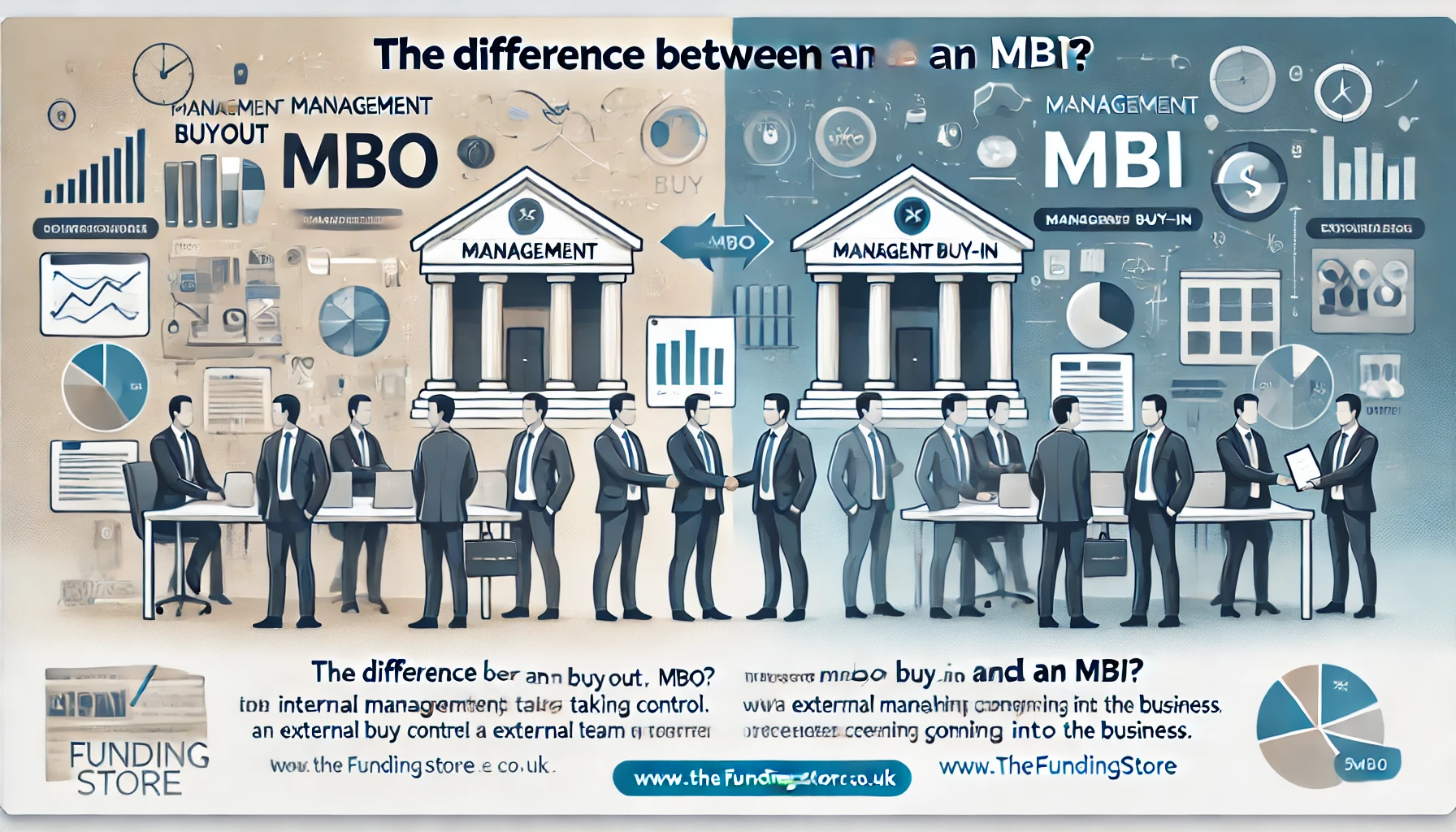When a company undergoes significant changes in ownership, two common routes often considered are a Management Buyout (MBO) or a Management Buy-In (MBI).
While both involve a shift in leadership and ownership, the key differences lie in the source of the management team and the strategic goals behind the transaction.
Understanding these differences is vital if you’re planning to restructure or exit your business, or if you’re part of a management team considering acquiring a company.
This guide will break down the nuances between MBOs and MBIs, offering insights to help you make an informed decision.
1. Management Buyout (MBO) Explained
A Management Buyout (MBO) occurs when the existing management team purchases the company from its current owners.
In this case, the leadership team already has an intimate understanding of the company’s operations, finances, and market position.
The familiarity with the company’s culture and processes provides a strong foundation for continued growth.
MBOs are often preferred by current owners looking for a smooth transition, especially if they believe their management team has the vision and capability to continue leading the company.
The continuity provided by the existing management often reduces operational disruptions and ensures a steady course of action.
To finance an MBO, management teams often require external funding.
If you’re considering an MBO, you might want to explore business acquisition funding options available to facilitate the process.
Key Benefits of an MBO:
- Continuity in leadership and operations
- Deep understanding of the company’s internal workings
- Lower risk due to knowledge of the company’s financial health
2. Management Buy-In (MBI) Defined
On the other hand, a Management Buy-In (MBI) occurs when an external management team purchases a controlling stake in a company.
This external team often brings fresh ideas, new strategies, and a different perspective, which can inject new life into a stagnant business or help it scale to the next level.
However, since the new team is not familiar with the internal operations and company culture, there may be an adjustment period where they need to learn the ins and outs of the business.
Extensive due diligence is crucial in an MBI, as the new management team will need a clear understanding of the company’s financial position, potential risks, and market opportunities before making an investment.
External management teams often use an MBI to drive major restructuring efforts or expansion, and they may require substantial capital to execute their vision.
If you’re considering an MBI, understanding your funding options is critical. Learn more about management buy-in financing and how to secure the necessary resources.
Key Benefits of an MBI:
- Fresh perspectives and strategies from an external team
- Opportunity to unlock hidden value and drive growth
- Potential for long-term transformation and improvement
3. Risk Factors: MBO vs MBI
Another critical difference between an MBO and MBI is the level of risk involved.
In an MBO, the management team already has in-depth knowledge of the company’s financial standing, operational challenges, and market conditions.
This familiarity significantly reduces the risk, as they can better assess and mitigate potential pitfalls.
In contrast, an MBI involves more risk due to the lack of internal knowledge.
The new management team will need to rely on extensive due diligence to understand the company’s financial health, customer base, supply chain, and other operational aspects.
While this can be an opportunity for innovative thinking, it also introduces greater uncertainty.
If you’re leading an MBI and want to mitigate these risks, it’s important to work with experienced advisors and secure proper funding.
Discover how business acquisition loans can support your MBI process.
Risk Comparison:
- MBO: Lower risk due to existing management’s deep knowledge of the company.
- MBI: Higher risk due to the external team’s limited familiarity with the company’s inner workings.
4. Strategic Goals of MBOs and MBIs
The goals of an MBO and MBI can also differ significantly.
In an MBO, the current management team may seek greater control over the strategic direction of the business, aiming to enhance performance and profitability.
This often results in a smoother transition, with a focus on steady growth and operational improvement.
Meanwhile, in an MBI, the external management team might bring new ideas, strategies, and innovations to the company.
Their primary goal may be to restructure, expand, or reposition the company for long-term growth.
The focus often shifts toward unlocking hidden value or addressing inefficiencies that the existing management may not have prioritised.
Whether your business would benefit from an internal leadership takeover or an external team’s fresh perspective depends on your company’s specific needs and circumstances.
For businesses looking to position themselves for long-term success, it’s important to evaluate the strategic direction carefully.
Strategic Focus:
- MBO: Continuity, internal growth, and operational efficiency.
- MBI: Innovation, restructuring, and unlocking new opportunities.
5. Financing Options for MBOs and MBIs
Financing plays a crucial role in both MBOs and MBIs.
Whether the management team is internal or external, acquiring the necessary capital is key to successfully executing the buyout.
Most businesses require a combination of equity investment, debt financing, and other forms of funding to complete the transaction.
At The Funding Store, we provide the latest information on sourcing the right funding solutions for both MBOs and MBIs.
From business loans, asset finance to invoice finance options, our team helps businesses navigate the complexities of financing these transactions.
Explore the various finance options we offer to make your management buyout or buy-in a reality.
MBO vs MBI – Which is Right for Your Business?
Both MBOs and MBIs can offer transformative opportunities for businesses looking to restructure or exit.
Choosing between an MBO and MBI depends on several factors, including the company’s current management structure, financial health, and strategic goals.
An MBO might be the right choice if continuity and internal leadership are crucial, while an MBI could be ideal if fresh perspectives and significant changes are needed.
Ultimately, whether you’re considering an MBO or MBI, obtaining the right financing and guidance is critical to ensuring a smooth and successful transition.
For more information on financing MBOs or MBIs, contact The Funding Store today.
We’ll help you explore the best options to support your business goals.
If you’re a small or medium-sized business looking for funding, then why not contact The Funding Store today.
We do not charge broker fees, and with access to one of the most extensive and competitive lending panels in the UK, can bring you fast, flexible solutions that meet your finance needs.
The Funding Store can help guide you through the funding process and find the best funding options that fit your specific needs.
Whether you’re looking to start a new business, expand an existing one, or cover unexpected expenses, The Funding Store can help you achieve your financial goals.
So don’t hesitate, contact us today on 01908 880420, to take the first step towards securing the funding you need to grow and succeed.
Share This Story, Choose Your Platform!
This article has been produced by www.TheFundingStore.co.uk for general interest. No responsibility for loss occasioned to any person acting or refraining from action as a result of the information contained in this article is accepted by The Funding Store Ltd. In all cases appropriate professional legal and financial advice should be sought before making a decision.








